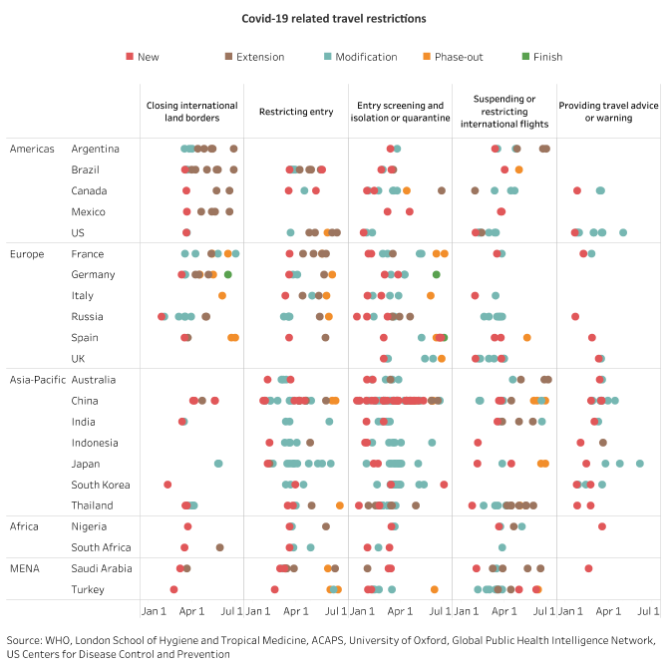In China, HSBC denied reports by Chinese official media accusing the bank of acting as an accomplice to the U.S. and lying about Huawei. In Spain, a nationwide lockdown is unlikely in the coming days despite the rising number of Covid-19 cases. In Chile, the president will make this week his annual state-of-the-nation speech. In South Africa, the Covid-19 outbreak could peak in August.
Meanwhile, Brazil’s Congress will discuss the veto on the extension of payroll tax cuts until 2021, and in Cote d’Ivoire, the Democratic Party (PDCI) will soon present its new presidential candidate.
Chart of the Week
As the number of Covid-19 infections surges in some European countries, new travel restrictions have been imposed over the past week. These new curbs on traveling will particularly affect tourism-dependent economies like Spain – the U.K. government requires now a two-week quarantine period for those arriving from Spain. As the graph below shows, in the early days of the pandemic, countries also started imposing travel restrictions in a somewhat uncoordinated way, particularly in Europe. This time around, however, the (re)introduction of nationwide travel restrictions might well be more contested politically, given the already evident economic effects of the pandemic-induced slowdown.
What to Watch
China
HSBC issued a statement on Chinese social media denying reports by official media that the bank had “framed” Huawei and aided the arrest of chief financial officer Meng Wanzhou in Canada in 2018. HSBC’s statement, published on its official WeChat account, was a response to a report in People’s Daily, the Chinese Communist Party’s official newspaper, accusing HSBC of acting as an accomplice to the U.S. and lying about Huawei. HSBC said that “the U.S. investigation of Huawei was not triggered by HSBC” and that the bank “has no malice against Huawei, nor has it ‘framed’ Huawei.” The People’s Daily report alleged that HSBC had been “setting traps” for Huawei since 2012. The U.S. has accused Meng of bank fraud for allegedly misleading HSBC about Huawei’s relationship to a company that sold U.S. technology to Iran.
Spain
The government of Prime Minister Pedro Sanchez is unlikely to reimpose a nationwide lockdown in the coming days despite the rising number of Covid-19 cases. The emergence of new clusters in the last two weeks has exposed the capacity limitations of some regional governments that lack the necessary contact-tracing personnel to control outbreaks. However, Sanchez will continue to allow the regions to manage the pandemic for now, since implementing another national lockdown at this stage would generate a significant political backlash. As a result, the regions most affected by new infections might reintroduce certain restrictions going forward if they are unable to control the outbreaks.
South Africa
South Africa enters a critical period as the Covid-19 outbreak is expected to peak in August. With a total of 445,433 Covid-19 cases reported nationwide and hospital capacity expected to be breached in the coming weeks, new restrictions are being considered. However, the government has little political and economic room to reinstate a full lockdown. Instead, a fresh four-week school closure starts on Monday, adding to recently renewed restrictions, including a night-time curfew and a ban on alcohol sales. On the fiscal front, the IMF is expected to approve South Africa’s application for a USD 4.2bn emergency loan on Monday.
Chile
President Sebastian Pinera will make his annual state-of-the-nation speech to Congress on 31 July; the speech was postponed from June because of the Covid-19 situation. The speech comes at a low point for Pinera, who last week suffered a resounding defeat in Congress when both chambers defied the government to approve a bill allowing people to withdraw up to 10% of their retirement savings. The pension withdrawal initiative has triggered a bout of in-fighting within the governing Chile Vamos (CV) coalition and weakened key cabinet members to the extent that a reshuffle is now seen as a question of when, not if. The speech itself is likely to focus on economic reactivation measures and on the implementation of the government’s new lockdown easing plan.
On the Horizon
ASIA
Japan
Following a rise in cases during a long holiday week, the Abe government’s advisory subcommittee on Covid-19 will discuss how to strengthen social distancing guidelines to contain the further spread of the outbreak. The panel will focus in particular on how to ensure greater compliance with industry guidelines among dining establishments, which have emerged as new sources of clusters. Economy Minister Yasutoshi Nishimura also suggested that the panel will stress that employers need to continue to allow telecommuting and generous sick leave. The administration has continued to resist calls for a new state of emergency that it fears could disrupt the reopening of the economy.
Korean Peninsula
North Korean leader Kim Jong Un convened an emergency politburo meeting on 25 July after a former defector who had left for South Korea in 2017 reportedly returned to the north with Covid-19 symptoms. This case is the first suspected case officially confirmed by Pyongyang, prompting the regime to strengthen public health controls that had been first introduced in January. South Korean authorities have questioned whether the defector had actually contracted the disease; the bigger issue in the south is how he was able to cross the demilitarized zone undetected.
EUROPE
Turkey
Legislation that would enable the government to tighten its grip on social media is expected to be approved by parliament this week. The law will require social media companies with more than one million daily users in Turkey to comply with stringent conditions or face bandwidth restrictions. Social media firms will have to appoint a legal representative in Turkey and store users’ personal data within the country.
Italy
The Senate will vote on EUR 25bn of extra spending on 29 July. Senate’s regulations require an absolute majority (161 votes) to pass this new budget deviation. The vote represents a delicate passage for the ruling coalition as it would require the external support of some senators to reach the required quorum.
LATIN AMERICA
Brazil
President Jair Bolsonaro is out of quarantine following his bout of Covid-19. He has continued to speak out in favor of hydroxychloroquine and against social distancing and continued business shutdowns. However, Congress will this week be the focus of activity, as the Senate should approve the constitutional amendment that turned a federal fund for basic education (Fundeb) permanent and increased its federal funding – contrary to the government’s wishes. The Senate should also vote on executive orders this week, including the one that sets out financial assistance to states and municipalities. Meanwhile, the vote on several presidential vetoes has been delayed in favor of negotiations between the government and Congress. However, there is still the risk of collapse in the negotiations and a massive overturn this week. There is also hurry on the part of Congress to resolve the veto on the extension of payroll tax cuts until 2021 as a support measure for companies struggling due to the pandemic; the government has offered to look into this in the context of the discussion on tax reform that will start this week, but Congress is likely to prefer overturning the veto instead.
MIDDLE EAST AND AFRICA
Cote d’Ivoire
The Democratic Party of Cote d’Ivoire (PDCI)is set to present Henri Konan Bedie as its official candidate this week amid persistent uncertainty concerning the ruling party’s candidate. Following the disqualification of Kouadio Konan Bertin, Bedie (86) was the only candidate at the party’s nationwide primary on 26 July. Meanwhile, President Alassane Ouattara has yet to announce as to whom should replace the late Amadou Gon Coulibaly as the flagbearer of the ruling Houphouetists Rally for Democracy and Peace (RHDP) for the 31 October general election. While the party’s establishment is pushing Ouattara to run for a controversial third term, Minister of Defense Hamed Bakayoko has also made public his ambitions to become the party’s candidate.





